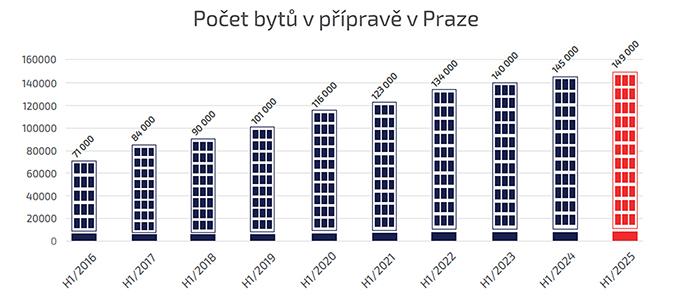2025-06-04
residential

Nearly 150,000 new apartments are under preparation in Prague, according to the latest analysis by Central Group. However, delays in the permitting process are limiting their entry to the market, contributing to an ongoing shortage of available housing. This shortage has resulted in a further decline in housing affordability. The latest CG Index shows that it now requires 15.5 years of average gross salary to purchase a new 70-square-metre apartment in the capital, maintaining Prague’s position as the least affordable city for housing in Central Europe. In the first quarter of 2025, approximately 2,550 new apartments were sold, representing a nearly two-thirds increase compared to the same period last year. This marks the strongest first-quarter sales performance in more than 15 years. However, the supply of new apartments has declined by 6% since the beginning of the year. The imbalance between supply and demand has led to a 10% year-on-year increase in new apartment prices, the highest rate among comparable cities in the region. High Number of Apartments in Planning, Slow Progress to Market Despite the high volume of projects—around 150,000 apartments at various stages of development—the permitting process remains slow. Historically, Prague has approved around 6,000 new apartments per year, while estimates from the Institute of Planning and Development (IPR) suggest that at least 10,000 units are needed annually to meet demand. Over the past two decades, the housing shortfall in Prague has grown by nearly 100,000 units. Dušan Kunovský, founder and CEO of Central Group, noted that addressing the delays in permitting is essential but not sufficient. He highlighted the need to improve spatial planning and reduce regulatory complexity, pointing to the recent approval of a zoning plan change in Žižkov, which took over 16 years to complete. Kunovský also emphasized that excessive regulation increases construction costs and slows development. Economic Impact of Delays The report suggests that expediting the permitting process could unlock significant economic benefits. Housing projects currently planned in Prague could accommodate approximately 300,000 people and generate considerable economic activity. Construction has a large multiplier effect, and the state could gain nearly CZK 190 billion in VAT revenues from these projects, with additional contributions to municipal budgets. Kunovský argues that prolonged delays increase apartment prices by at least 15%, impacting public finances, businesses, and homebuyers. Prague’s Housing Affordability Remains the Lowest in the Region The CG Index indicates that it now takes 15.5 years of gross salary to purchase a 70-square-metre apartment in Prague, an increase from six months ago and a substantial rise compared to 2015. This makes Prague the least affordable capital for housing in Central Europe. The Index is based on the average gross monthly salary in Prague (CZK 63,106) and the average price of a new 70-square-metre apartment (CZK 11,756,291). It draws from data provided by the Ministry of Labour and Social Affairs and a joint market analysis by Central Group, Trigema, and Skanska. Proposals to Improve Housing Availability Central Group has outlined four key recommendations to improve housing availability, aligning with suggestions from the National Economic Council of the Government (NERV): 1. Accelerate and Simplify Permitting: Streamlining the permitting process is critical to increasing the supply of both private and public housing. 2. Reduce Construction Industry Overregulation: Simplifying construction standards could lower costs and encourage development while balancing environmental and affordability considerations. 3. Improve Spatial Planning: Reforming outdated zoning plans is necessary to ensure sufficient land availability for new developments and to better utilize brownfield sites. 4. Expand Affordable Housing Initiatives: Cities and municipalities should increase their role in affordable housing construction, potentially involving private sector developers and banks to leverage expertise and financing. The new DESIGN BUILD system proposed by the Initiative for Affordable Housing (IDB) could facilitate standardized, cost-effective municipal housing projects.

